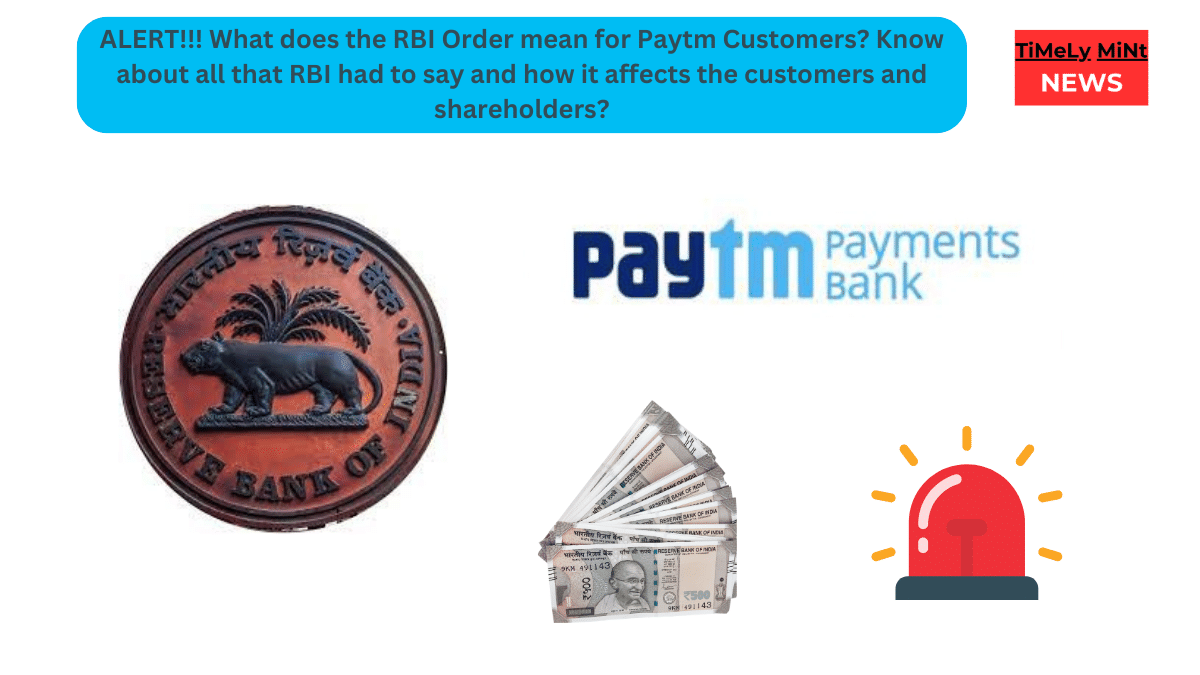In a move that shocked India’s fintech industry on 1st Feb 2024, the Reserve Bank of India (RBI) ordered Paytm Payments Bank to immediately stop onboarding new customers or facilitating additional transactions and deposits after February 2024.
This far-reaching regulatory action will severely curtail Paytm Payments Bank’s operations, forcing parent One97 Communications to abandon its payments bank ambitions and partner with third-party banks instead.
RBI Audit Reveals Compliance Shortcomings
The RBI conducted a routine audit of Paytm Payments Bank in March 2023, which unearthed “certain material supervisory concerns” as per a later comprehensive compliance review.
While the specific compliance gaps were not disclosed, clearly Paytm’s responses failed to satisfy the regulator on resolution timelines and commitments.
Consequently, the RBI invoked Section 35A of the Banking Regulation Act, 1949 to ban Paytm Payments Bank from registering new customers or allowing further deposits and transactions in existing accounts beyond February 29, 2024.
Massive Blow to Paytm’s Growth Prospects
With over 33 crore digital wallet users and 10 crore monthly transacting users, Paytm Payments Bank sits at the core of parent One97’s ambitions to emerge as India’s go-to financial services platform.
- The ban restricts Paytm’s ability to effectively monetize payments from its massive user base.
- Cross-selling of lending, insurance and wealth management products will take a hit without an in-house payments bank as the foundation.
As per company estimates, the RBI diktat could lead to potential revenue declines of Rs 300-500 crores annually – a massive setback for a firm aiming to turn profitable after years of losses.
Investor Wealth Eroded by Over Rs 4,000 Crores
Rattled investors punished Paytm stock as prices crashed over 20% to hit lower circuit filters on the day RBI announced restrictions on its payments bank business.
Over Rs 4,000 crores of investor wealth was wiped out in a single day over concerns on growth prospects and declining revenue from Paytm’s most popular product.
Target prices from brokerages now range from Rs 500-650, nearly 30% below current market price, pointing to extended pain for investors.
The Road Ahead for Paytm
While the RBI order deals a body blow to Paytm in the short term, the company emphasized its payments and financial services ambitions will continue in partnership with third-party banks.
- Paytm needs to leverage its large user base to distribute banking, insurance and lending products offered by partners.
- The company will focus on rapidly growing its non-bank financial company (NBFC) business.
- However, Paytm’s upside remains dependent on resolving RBI’s supervisory concerns highlighted during the audit[1].
Getting back into the good books of the regulator is paramount for One97 to turbocharge growth of its insurance, credit and wealth management offerings.
Until then, the RBI order rings a death knell for Paytm Payments Bank, forcing the pioneer of India’s payments revolution to pivot to a partnership-driven model within a compressed timeframe.
What Does The RBI Order Mean For Customers? FAQ’s or Frequently asked questions
The RBI diktat leaves millions of Paytm customers in limbo even as their money remains protected in existing accounts. We answer some key questions bothering users:
1. Can I still use my Paytm wallet and UPI after February 2024?
No. You can only withdraw money from these accounts after the deadline. No further deposits or transactions will be allowed.
2. What happens to my existing wallet/UPI balances?
Your money is completely safe. You can withdraw your full balances even after the RBI restrictions kick in.
3. Can I still recharge, pay bills, book tickets after February 2024?
No. All such abilities to transact will be curtailed once the ban comes into effect.
4. Can I transfer money to bank accounts or other wallets after February 2024?
No. All money transfer services will be discontinued under the RBI order.
5. Will my wallet KYC status remain valid?
Yes. Your KYC status will remain unchanged by the RBI order.
6. Can I use my Paytm FASTag for toll payments after February 2024?
No. Paytm FASTag will stop working for toll transactions once the ban kicks in.
7. Will I continue to earn interest on Paytm wallet balances?
No. Interest payouts will cease after the RBI clampdown comes into force.
8. Can I take a personal loan, credit card or insurance from Paytm after February 2024?
No. Onboarding new customers for financial products will stop after the RBI deadline.
9. What about my existing Paytm loan or insurance policy?
Your current financial products will remain unaffected. But you can’t avail any new loans, cards or insurance after February 2024.
10. When will Paytm payments bank start working again?
Unclear. Paytm first needs to resolve RBI’s supervisory concerns highlighted in the audit before the ban can be lifted.
Conclusion
The RBI order deals a body blow to Paytm’s payments bank which is central to its financial services ecosystem. With revenue declines predicted, the company needs to mitigate compliance gaps and potential customer losses.
As India’s leading fintech player, Paytm is likely equipped with the resources to absorb this temporary shock. With potential revenue declines predicted to be Rs 300-500 crores annually, the company cannot afford to delay further in resolving RBI’s supervisory concerns.
In the long run, Paytm’s customer reach and innovative product suite could still make it a winner. But the RBI order ensures there will be some painful adjustments in the interim.













